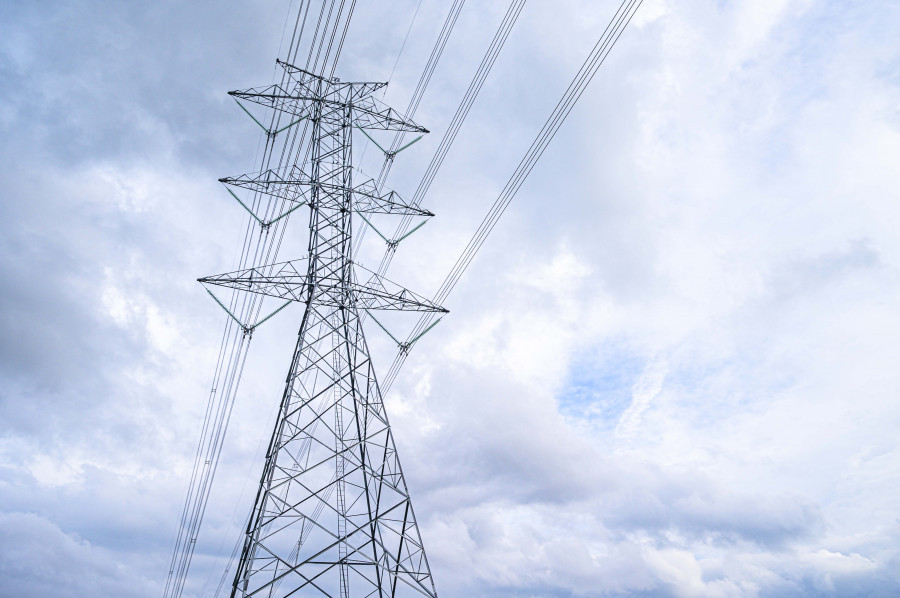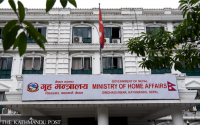National
More private companies keen on selling power to India and Bangladesh
Legal and electricity transmission hurdles continue to cause delays in their efforts to export surplus energy.
Prithvi Man Shrestha
Nepal Electricity Authority (NEA), the state-owned power utility body, sold electricity in India's power exchange market for over a month from the beginning of November last year. It was the first time that Nepal sold electricity to the southern neighbour’s power exchange market through a competitive bidding.
The move opened up a new avenue for selling electricity to India, and even to Bangladesh, encouraging Nepal’s private sector companies to rush to obtain trading and export licences from the government.
“Two to three companies from the private sector have applied for trading and export licences so far,” said Madhu Bhetuwal, spokesperson for the Ministry of Energy. “The ministry is positive about granting approval to them.”
Officials and private sector power developers say the country needs to ensure power export to avoid electricity wastage during the rainy season.
The NEA, which is the sole power utility body in the country, said it suffered power wastage during the monsoon last year as there was surplus energy.
The demand for electricity was around 1,500MW while the country’s generation capacity was 2,000MW, of which 1,900MW was generated from hydropower projects after the 456MW Upper Tamakoshi Hydropower Project came into operation in August, according to NEA.
Kul Man Ghising, NEA managing director, told the Post in October last year that only 900MW-1,100MW was consumed during night at low demand hours. In daytime, 1,200MW-1,300MW was consumed when the demand was the least, leading to wastage.
The Indian government’s permission to the NEA to sell electricity generated from two projects—the 24MW Trishuli Hydropower Project and the 15MW Devighat Hydropower Project—in November helped the power utility control wastage. It had sold electricity to India's power exchange market till the early days of December last year.
Now Nepal’s private sector wants to engage in power trading, particularly export electricity to India. They have started setting up power trading companies, and some of them have already sought approval from the Energy Ministry to sell electricity in the domestic and international markets. They have also been holding talks with Indian and Bangladeshi companies for partnership to sell electricity.
Nepal Power Exchange Limited, a Nepali private sector power trading company, and India’s Manikaran Power Limited, signed a memorandum of understanding (MoU) on energy trading on January 10.
According to the MoU, Manikaran Power Limited has pledged to acquire a 15 percent stake in Nepal Power Exchange Limited.
“Manikaran has also agreed to purchase 500 MW of electricity from Nepal Power Exchange Limited,” Ganesh Karki, vice-president of Independent Power Producers of Nepal (IPPAN), a grouping of private sector power developers, told the Post in early January. It is the company established by most members of IPPAN in 2019.
Nepal Power Exchange Limited is optimistic that the government will take a decision on granting it a trading licence.
Ashish Garg, managing director of Nepal Power Exchange Limited, said that the company expects to get a licence from the government in the next two months.
“The main objective of establishing this company three years ago was to encourage the government to open the energy industry to the private sector,” said Garg. “Initially, this company was not taken seriously just like the NEA’s own power trading company. After electricity spilled last monsoon, the government also appears to be serious about opening the door for the private sector to enter power trading so as to open up avenues to increase consumption of electricity at home and abroad.”
According to him, the company is making all out efforts to make export of electricity through the private sector possible. After offering 15 percent stake in the company to Manikaran, Nepal Power Exchange Limited also plans to rope in India Energy Exchange Limited, one of the power exchange markets in India, as a shareholder.
“We have also opened the door for India Energy Exchange Limited to buy an additional 15 percent stake in our company to facilitate bilateral energy trade between Nepal and India,” said Garg. “Once that happens, there will be a 30 percent stake of Indian entities in our company.”
Likewise, Nepal Infrastructure Bank, the country’s only bank dedicated to financing the infrastructure project, has also proposed to establish a power trading company as its subsidiary. The bank is now seeking the government’s approval to sell electricity in the domestic and international markets through the subsidiary company.
“It has been six-seven months since we applied seeking approval from the government for power trading,” said Ram Krishna Khatiwada, chief executive officer of the Nepal Infrastructure Bank. “We are also discussing with Indian and Bangladeshi companies for a partnership for power trading arrangements among Nepal, India and Bangladesh.”
He, however, said that the bank was yet to register a separate power trading company.
“We have only submitted an application for approval,” Khatiwada told the Post.
According to Shailendra Guragain, former president of IPPAN, around half a dozen power trading companies are already in the process of registration.
“This shows the rising interest of the private sector in the power trading business,” he added.
Power Trading Company Limited (Bidyut Byapar Company Ltd), a subsidiary of the NEA, received the government’s permission to carry out cross-border trading of electricity last December.
But the company has yet to start trading power with India as an independent entity, although its parent company NEA has long been trading electricity with its southern neighbour. It is the first company to receive power trading approval from the government, while the NEA has authority to involve in power trade as per section (20) of the Nepal Electricity Act-1984.
“The main reason behind our decision to enter power trading is that an avenue has opened for Nepal to sell electricity in India,” said Khatiwada. “Our belief is that exporting power will be easier provided we can bring entities from relevant countries on board.”
He said his company has been holding discussions with two-three companies from India and Bangladesh for potential partnerships.
While India has opened the door for Nepal to sell electricity in its power exchange market, Nepal and Bangladesh are also holding talks for the trading of power between the two countries.
Bangladesh has already decided to buy 500MW of electricity from the 900MW Upper Karnali Hydropower Project to be developed by India’s GMR Group which has set up GMR Upper Karnali Hydropower Limited to develop the project in Nepal. Bangladesh has also shown an interest in developing hydropower projects in Nepal, including the Sunkoshi III Hydropower Project, according to the Energy Ministry.
During the secretary-level Joint Steering Committee meeting between Nepal and Bangladesh in September last year, the two sides also agreed to develop a dedicated transmission line between the two countries by taking India on board.
Officials, private sector representatives and experts say that the possibility of exporting electricity to both India and Bangladesh has created a new opportunity for the Nepali private sector to invest in the areas of development of power and trading of electricity. They also said that Nepal could also reduce its growing trade deficit particularly with India, by exporting electricity.
Nepal faces a trade deficit with India worth Rs590 billion as of the first seven months of the current fiscal year, according to the Trade and Export Promotion Centre, an agency under the Commerce Ministry.
Govinda Nepal, a senior economist, said the availability of a larger market would help boost investment in Nepal’s power sector.
“Nepal also does not have to waste its excess electricity and export of power will also help reduce the trade deficit if not reverse it,” he said.
But those interested in power trading still have a long way to go. Officials said that the main reason behind the delay in giving approval is the lack of a clear provision in the existing electricity law about granting licences for trading.
“The Electricity Act-1992 does not have any provision about granting licences for the trading of power,” said Gokarna Raj Pantha, an official at the Electricity Regulatory Commission. “The law should first open the door for the private sector.”
A Bill on Amendment and Integration of Existing Electricity Laws has been pending at the National Assembly since mid-July 2020. As per Section 29 of the bill, private sector companies can also get a licence for electricity trade, and such licenced companies can engage in inter-country trade of power.
Officials at the Energy Ministry say they have been discussing working procedures that would provide trading and export licences to the private sector.
“The proposed working procedure has also made provisions regarding access to transmission lines, wheeling charges to be paid by the trading companies, conditions for termination of licence and penalty to be imposed for breaching licensing conditions and taxation,” said Bhetuwal, the spokesman for the Energy Ministry.
The ‘Procedure for Approval and Facilitating Import/Export (Cross Border) of -Electricity’ introduced by India’s Power Ministry in February last year, has made it mandatory for the exporter of power to first get an export licence from the authorities of the neighbouring country before selling electricity in the Indian power market.
Another problem for the newly established power trading companies and those willing to enter the market is that they don’t have power to sell and have not signed any power purchase agreement with any power developer.
Prabal Adhikari, chief of the Power Trading Company Limited, said that currently the company is ready to sell electricity from the projects that have signed PPA with the NEA.
“In the future, we will have to sign separate PPAs with power producers which will ensure power availability with us to sell it in the domestic and international markets,” said Adhikari.
Representatives of the private sector power trading companies say trading licences would at least pave the way for them to hold discussions with power producers in Nepal and power importers from India and Bangladesh.
“We can start discussions with power developers in Nepal who are struggling to sign PPA with the NEA for potential purchase of their electricity and with the buyers from India,” said Khatiwada.




 8.84°C Kathmandu
8.84°C Kathmandu














